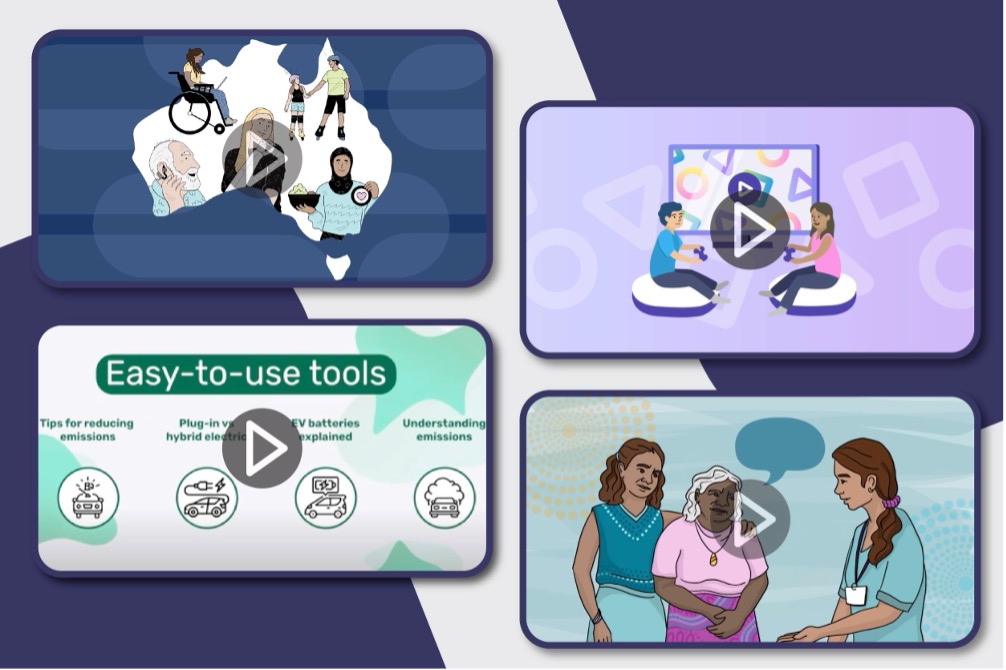Clear, convincing, and creative: why we recommend animated explainer videos

When we have a message to share that’s complex, or perhaps a little dry, some essential tools we like to pull from our kit are graphics, images, illustrations and videos. These techniques help make information more engaging, accessible and memorable – all key factors in behaviour change.
Put these visual tools together with great dialogue and a catchy tune and what do you get? A powerful visual communication product: the animated explainer video.
These short videos briefly explain or introduce a concept using simple, animated illustrations, icons, and motion graphics. They typically include a scripted voiceover and background music, and even basic sound effects. Dynamic audio-visual products like this are more engaging to an audience than text or audio alone and can help them understand and retain information.
For our clients, animated explainer videos have been the right choice for a range of topics:
- promoting public consultations on social issues, including the National Autism Strategy, the Disability Discrimination Act Review, and Foundational Supports
- changes in legislation or policy, including First Nations Aged Care Reform and new classifications for gambling-like content in video games
- information or resources regarding social rights, community wellbeing, and environment, including the Royal Commission into Defence and Veteran Suicide (First Nations), Tackling Mosquitoes Together community education program, Green Vehicle Guide website.
Our process: get strategic, stay creative
The first step is to identify and think carefully about our audience and our message. We’re not chasing flashy visuals or clever wordplay, we’re figuring out the most appropriate tone, style and structure for the audience. We consider our aims – do we want the audience to take an action? Learn something? And we consider what the audience needs – perhaps we should include context for new information? Maybe provide real-world examples? Every decision comes back to the audience experience.
From this strategic phase, our Production Manager Casey moves into scriptwriting. Working with our project team and the client, she makes sure to capture key messages written as dialogue that can be matched with animation. The script includes the voiceover text and a high-level description of the on-screen visuals. Our Creative Manager Kirstin gets involved during scripting to draft sample sketches or graphics to demonstrate our proposed animation style.
Once the script and visual approach are finalised, Kirstin creates a storyboard. This illustrates the entire voiceover so that our team and our client can visualise, consider, and refine any details before moving into production. Preparing a comprehensive overview of the animated explainer at this stage streamlines the actual animating.
Moving next into production gives us a chance for any final creative tweaks, but this step should be basically surprise free - we record the voiceover, select a music track, and animate the storyboard. Bringing these creative pieces together produces a complete video, ready to be captioned and often translated into Auslan.
Considerations: every detail matters
We’re lucky to work on many projects that aim to help specific or hard-to-reach audiences with distinct communication preferences, like First Nations communities or Autistic people. We also often deal with highly sensitive subjects, such as the Royal Commission into Defence and Veteran Suicide. So, it’s crucial to carefully consider things like tone, language and style throughout the creative process.
Tone and language – scripts that use jargon, fancy words, or a lecturing tone turn audiences off. We instead use clear, simple wording. This doesn’t mean over-simplifying or leaving information out – it just means meeting audiences where they are with a strength-based approach. If we trust our audiences and treat them with respect, they’ll do the same.
Visual style – Abstract concept? We’ll use icons or illustrations to spark imagination and critical thinking. Trying to connect with marginalised communities? Time to reach for photos that show real people and provide much needed onscreen representation. Need to increase information recall? Let’s choose some key words to pop onscreen. Along with tried and tested methods like this, we love to get creative with new ideas to develop the right style for our goals.
Voiceover artist and speaking style – For each script, we look for a voiceover artist of an appropriate age, gender and background who the audience can trust and connect with. We provide the artist with a voiceover brief to guide their speaking style. Whether they adopt a quick snappy tone or speak more slowly and somberly all depends on the subject matter and audience.
Accessibility – At The Social Deck we design every product with accessibility in mind. For explainer videos, we particularly consider things like colour contrast for visual accessibility and providing captions for audio accessibility. Many projects require Auslan translations, such as the Disability Discrimination Act and National Autism Strategy national consultations, and we work with our translation partners to match the visual identity as shown here.

Key learnings: animated explainers can be made fit for just about every purpose
Animated explainers have broad appeal, a long shelf life, and can be easily adapted – such as cut down into social media content or translated into other languages. They are a great option to get important information out there quickly and effectively. Animation isn’t the easy way out, but it’s format that can offer creative options and production efficiencies that live action videos can’t.
We’ve crafted a solid foundation of skills, techniques and strategies for making animated explainers that we build on with fresh creative ideas for every new project and subject matter. We hope these insights can give some perspective for your own content, and of course we’re only a storyboard away.
Watch our animated explainer - A quick guide to classification changes for video games










